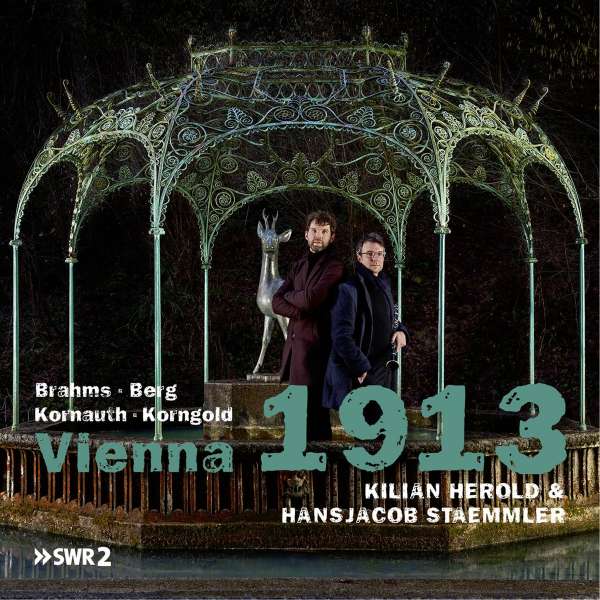Der Titel dieser CD stammt von zwei Werken, die im Jahr 1913 in Wien entstanden sind, Alban Bergs Vier Stücke für Klarinette und Klavier op. 5 und Egon Kornauths Sonate für Klarinette und Klavier, mit der das Programm beginnt. Kornauth (1891-1959) war ein österreichischer Komponist und Dirigent. Er hatte bei Robert Fuchs, Franz Schreker und Franz Schmidt studiert. Die Musik des Spätromantikers ist heute nahezu vergessen.
Kilian Herold und Hansjacob Staemmler liefern mit einer spannenden und vitalen, im Andante espressivo auch sehr gefühlvollen Interpretation ein überzeugendes Plädoyer für die auf dieser CD erstmals auf Tonträger erklingenden Sonate. Sie gefällt durch eine Fülle guter und schöner Einfälle.
Die ständigen Veränderungen in Tempo, Artikulation und Dynamik unterliegenden Vier Stücke von Alban Berg sind in einer phänomenalen Interpretation zu hören. Ich glaube nicht, dass ich die vielen Ausdrucksformen dieser Komposition schon in einer derartig packend expressiven und atmosphärisch dichten Aufführung gehört habe.
Die technisch sehr anfordernde und komplexe Musik erklingt bei Herold und Staemmler so, als sei es das Natürlichste der Welt, diese exquisite Musik so schön und bedeutungsvoll werden zu lassen.
Brahms schrieb die erste der dunkel gefärbten, herbstlichen Sonaten seines Opus 120 für Klarinette und Klavier im Jahre 1894. Kilian Herold gibt mit seinem feinen Begleiter der Musik eine großartige Noblesse und auch viel verinnerlichte Ausdruckskraft. Die beiden Interpreten zeigen, welche Vergeistigung Brahms im Alter erreicht hatte. Hier ist alles konzentriert auf eine ausdruckstiefe und emotionale Aussage.
Nicht weniger ansprechend sind die beiden für Klarinette bearbeiteten Gesänge von Korngold. Kilians Klarinettenspiel ist, insbesondere was die Farbschattierungen und die klangliche Schönheit angeht, atemberaubend.
The title of this CD comes from two works written in Vienna in 1913, Alban Berg’s Four Pieces for Clarinet and Piano, Op. 5, and Egon Kornauth’s Sonata for Clarinet and Piano, with which the program begins. Kornauth (1891-1959) was an Austrian composer and conductor. He had studied with Robert Fuchs, Franz Schreker and Franz Schmidt. The music of the late romantic is almost forgotten today.
Kilian Herold and Hansjacob Staemmler make a convincing case for the sonata, which is heard in a world premiere recording, with an exciting and vital interpretation that is also very emotional in the Andante espressivo. It pleases with a wealth of good and beautiful ideas.
Alban Berg’s Four Pieces, which are subject to constant changes in tempo, articulation and dynamics, are heard in a phenomenal interpretation. I don’t think I have heard the many expressions of this composition in such a grippingly expressive and atmospherically dense performance.
In this technically very demanding and complex music, Herold and Staemmler play as if it was the most natural thing in the world to make this exquisite piece so beautiful and meaningful.
Brahms wrote the first of the darkly colored, autumnal sonatas of his Opus 120 for clarinet and piano in 1894, and Kilian Herold, with his fine accompanist, gives the music a magnificent nobility and also much interiorized expressiveness. The two performers show the spiritualization Brahms had achieved in his old age. Here everything is concentrated on an expressive and emotionally tasteful statement.
Korngold’s two songs arranged for clarinet are no less appealing. Kilian’s clarinet playing, especially in terms of shades and tonal beauty, is breathtaking.




















